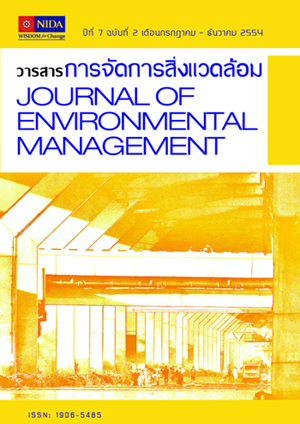การเปลี่ยนแปลงระบบการจัดการขยะที่ไม่เป็นทางการไปสู่ระบบที่เป็นทางการ Formalization of Informal Waste Management System
บทคัดย่อ
การลดปริมาณขยะและการนำขยะกลับมาใช้ประโยชน์ในสังคการเปลี่ยนแปลงระบบการ จัดการขยะที่ไม่เป็นทางการไปสู่ระบบที่เป็นทางการ Formalization of Informal Waste Management Systemมไทย ส่วนหนึ่งเกิดจากระบบที่เรียกว่า “ระบบที่ไม่เป็นทางการ” ซึ่งขึ้นกับกลไกราคา การทำงานของระบบดังกล่าวเป็นอิสระ ไม่มีแบบแผนและส่วนใหญ่ไม่อยู่ภายใต้การควบคุมของรัฐและท้องถิ่น ซึ่งแม้จะเกิดประโยชน์ต่อสังคมไทย แต่ก็ก่อให้เกิดปัญหาต่อการจัดการขยะและความเสี่ยงด้านสุขสภาวะต่อชุมชนและ คนคุ้ยขยะ ซึ่งเป็นองค์ประกอบหนึ่งของระบบดังกล่าว องค์กรปกครองส่วนท้องถิ่นหลายแห่งตระหนักต่อปัญหาและพยายามปรับสภาพแวดล้อม ในการทำงานของคนคุ้ยขยะ เช่น การใช้บริการด้านสุขภาพ การออกกฎหมายเพื่อรองรับสถานะของคนคุ้ยขยะเป็นต้น ทั้งนี้ เพื่อให้การจัดการขยะไปสู่ระบบที่เป็นทางการและมีประสิทธิภาพมากขึ้น
Waste reduction and recycling in Thai society is partially related to the role of an informal system that operates through market mechanisms. Generally, the operation of this system is not regulated and controlled by state and local governments. Despite its contributions to waste reduction and other societal benefits, the informal system has posed both environmental and health risks to surrounding communities, and especially, waste pickers who are part of the informal system. Several local governments are increasingly aware of these risks and attempt to formalize this informal system, for example, by providing healthcare services or by creating legal and institutional structures for waste pickers. Formalization of this informal system could improve efficiency in waste management.



